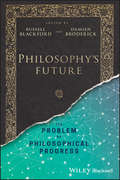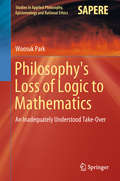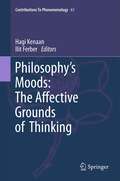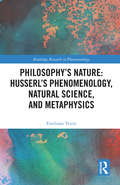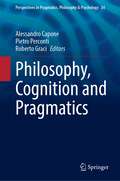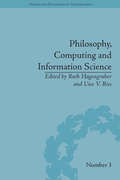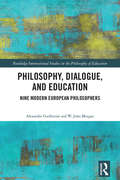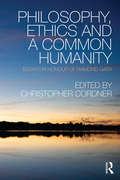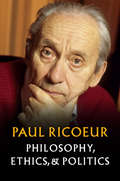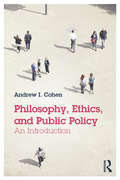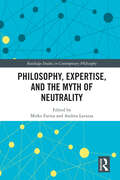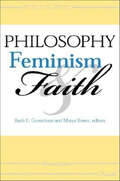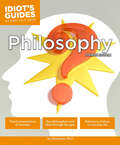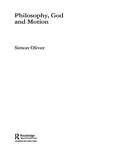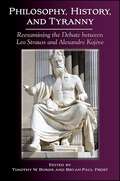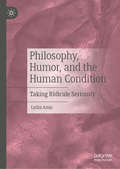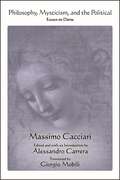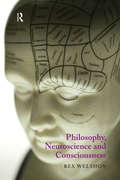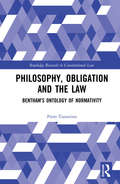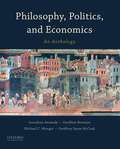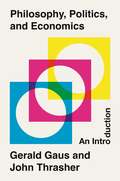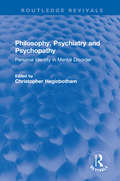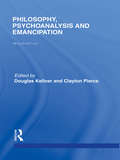- Table View
- List View
Philosophy's Future: The Problem of Philosophical Progress
by Damien Broderick Russell BlackfordPhilosophy's Future: The Problem of Philosophical Progress diagnoses the state of philosophy as an academic discipline and calls it to account, inviting further reflection and dialogue on its cultural value and capacity for future evolution. Offers the most up-to-date treatment of the intellectual and cultural value of contemporary philosophy from a wide range of perspectives Features contributions from distinguished philosophers such as Frank Jackson, Karen Green, Timothy Williamson, Jessica Wilson, and many others Explores the ways philosophical investigations of logic, world, mind, and moral responsibility continue to shape the empirical and theoretical sciences Considers the role of contemporary philosophy in political issues such as women's rights, the discrimination of minorities, and public health
Philosophy's Loss of Logic to Mathematics: An Inadequately Understood Take-Over (Studies in Applied Philosophy, Epistemology and Rational Ethics #43)
by Woosuk ParkThis book offers a historical explanation of important philosophical problems in logic and mathematics, which have been neglected by the official history of modern logic. It offers extensive information on Gottlob Frege’s logic, discussing which aspects of his logic can be considered truly innovative in its revolution against the Aristotelian logic. It presents the work of Hilbert and his associates and followers with the aim of understanding the revolutionary change in the axiomatic method. Moreover, it offers useful tools to understand Tarski’s and Gödel’s work, explaining why the problems they discussed are still unsolved. Finally, the book reports on some of the most influential positions in contemporary philosophy of mathematics, i.e., Maddy’s mathematical naturalism and Shapiro’s mathematical structuralism. Last but not least, the book introduces Biancani’s Aristotelian philosophy of mathematics as this is considered important to understand current philosophical issue in the applications of mathematics. One of the main purposes of the book is to stimulate readers to reconsider the Aristotelian position, which disappeared almost completely from the scene in logic and mathematics in the early twentieth century.
Philosophy's Moods: The Affective Grounds of Thinking
by Ilit Ferber Hagi KenaanPhilosophy's Moods is a collection of original essays interrogating the inseparable bond between mood and philosophical thinking. What is the relationship between mood and thinking in philosophy? In what sense are we always already philosophizing from within a mood? What kinds of mood are central for shaping the space of philosophy? What is the philosophical imprint of Aristotle's wonder, Kant's melancholy, Kierkegaard's anxiety or Nietzsche's shamelessness? Philosophy's Moods invites its readers to explore the above questions through diverse methodological perspectives. The collection includes twenty-one contributions by internationally renowned scholars as well as younger and emerging voices. In pondering the place of the subjective and personal roots that thinking is typically called to overcome, the book challenges and articulates an alternative to a predominant tendency in philosophy to view the theoretical content and the affective side of thought as opposed to one another.
Philosophy's Nature: Husserl's Phenomenology, Natural Science, and Metaphysics (Routledge Research in Phenomenology)
by Emiliano TrizioThis book offers a systematic interpretation of the relation between natural science and metaphysics in Husserl’s phenomenology. It shows that Husserl’s account of scientific knowledge is a radical alternative to established methods and frameworks in contemporary philosophy of science. The author’s interpretation of Husserl’s philosophy offers a critical reconstruction of the historical context from which his phenomenological approach developed, as well as new interpretations of key Husserlian concepts such as metaphysics, idealization, life-world, objectivism, crisis of the sciences, and historicity. The development of Husserl’s philosophical project is marked by the tension between natural science and transcendental phenomenology. While natural science provides a paradigmatic case of the way in which transcendental phenomenology, ontology, empirical science, and metaphysics can be articulated, it has also been the object of philosophical misunderstandings that have determined the current cultural and philosophical crisis. This book demonstrates the ways in which Husserl shows that our conceptions of philosophy and of nature are inseparable. Philosophy’s Nature will appeal to scholars and advanced students who are interested in Husserl and the relations between phenomenology, natural science, and metaphysics.
Philosophy, Cognition and Pragmatics (Perspectives in Pragmatics, Philosophy & Psychology #34)
by Alessandro Capone Pietro Perconti Roberto GraciThis book contains essential contributions to enrich and broaden the application field of pragmatics. It provides an example of how the fruitful reflections and refined conceptual distinctions born in the philosophical field can find a practical application in addressing social, cognitive, clinical, and psychological problems. Its chapters address, from different points of view, the relationship between pragmatic linguistics and philosophy, and outline the possible application of pragmatic theories to different domains. Developed during the third Pragmasophia international conference, whose name is derived from the Greek terms πρᾶγμα (action, fact) and σοϕία (knowledge, science), the book aligns itself with its aim to study human actions and activities and how they take shape through language. But ‘Pragma’ and ‘Sophia’ also signal another purpose: highlighting the importance of creating links between empirical investigations on language use, and more traditional philosophical approaches. In this reading, ‘Pragma’ represents the experimental goal devoted to analysing and interpreting language facts. In contrast, the term ‘Sophia’ recalls the original vocation of past philosophers to pursue an ideal of ‘pure knowledge’, disconnected from any practical-economic interest. While maintaining the conference's original purpose of encouraging productive comparisons between different approaches, the book consists of two sections: first, on philosophical approaches, recalls more theoretical aspects (closer to the term ‘Sophia’); the second, ‘Inferential and Cognitive Pragmatics,’ addresses more practical issues affecting domains such as Greek literature, pragmatic disorders, dictionary entries, and speech analysis. The reader, whether in linguists, philosophy or psychology, obtains a complete overview of the most advanced current research lines, both theoretical and empirical, and thus contributes to broadening the scope of pragmatics.
Philosophy, Computing and Information Science (History and Philosophy of Technoscience #3)
by Ruth Hagengruber Uwe V. RissOver the last four decades computers and the internet have become an intrinsic part of all our lives, but this speed of development has left related philosophical enquiry behind. Featuring the work of computer scientists and philosophers, these essays provide an overview of an exciting new area of philosophy that is still taking shape.
Philosophy, Dialogue, and Education: Nine Modern European Philosophers (Routledge International Studies in the Philosophy of Education)
by Alexandre Guilherme W. John MorganPhilosophy, Dialogue, and Education is an advanced introduction to nine key European social philosophers: Martin Buber, Mikhail Bakhtin, Lev Vygotsky, Hannah Arendt, Emmanuel Levinas, Maurice Merleau-Ponty, Simone Weil, Michael Oakeshott, and Jürgen Habermas. This detailed yet highly readable work positions the socio-political views of each philosopher within a European tradition of dialogical philosophy; and reflects on the continuing theoretical relevance of the work of each to education generally and to critical pedagogy. The discussion in each chapter is informed by materials drawn from various scholarly sources in English and is enriched by materials from other languages, particularly French, German, and Russian. This enhances the comparative European cultural perspective of the book; and connects the work of each philosopher to wider intellectual, political, and social debates. The book will appeal to academics, postgraduates, and researchers working in philosophy, philosophy of education, and in educational, cultural, and social studies more generally. Advanced undergraduate students would also benefit from the book’s discussion of primary sources and the authors’ suggestions for further reading.
Philosophy, Ethics and a Common Humanity: Essays in Honour of Raimond Gaita
by Christopher CordnerThe work of Raimond Gaita, in books such as Good and Evil: An Absolute Conception, A Common Humanity and The Philosopher’s Dog, has made an outstanding and controversial contribution to philosophy and to the wider culture. In this superb collection an international team of contributors explore issues across the wide range of Gaita’s thought, including the nature of good and evil, philosophy and biography, the unthinkable, Plato and ancient philosophy, Wittgenstein, the religious dimensions of Gaita’s work, aspects of the Holocaust, and aboriginal reconciliation in Australia.
Philosophy, Ethics, and Politics
by Paul RicoeurIn this series of interviews and dialogues which took place between 1981 and 2003, Paul Ricoeur addresses some of the central questions of political philosophy and ethics: justice, violence, war, the environmental crisis, the question of evil, ethical and political action in the polis. Philosophical issues are brought to bear on present-day concerns and the practical realities of contemporary politics. How can the philosopher speak about politics without claiming superior insight or a higher order of knowledge? Ricoeur distinguishes three levels of society: ‘tools’ (modes of production and the accumulation of technology), ‘institutions’ (which are tied to national cultures) and ‘values’ (which claim to be universal). The philosopher’s task is to probe each of these levels and open up spaces for reflection, criticism and democratic deliberation. It is to explore the paradoxes of the political rather than invoking certainties dictated by conscience. Just as there no longer exists a grand narrative about the past, so too there is no longer any utopia capable of projecting the desired future. What remains is human creativity, which marks the source common to the institutional frameworks that are already present and the horizons that extend beyond them. The philosopher’s engagement lies in the promise to revive this source at the very moment it appears to dry up under the weight of the real. This volume of interviews and dialogues with one of the most important French philosophers of the post-war period will be of interest to anyone interested in the great political and ethical questions of our time.
Philosophy, Ethics, and Public Policy: An Introduction
by Andrew I CohenWhat makes a policy work? What should policies attempt to do, and what ought they not do? These questions are at the heart of both policy-making and ethics. Philosophy, Ethics and Public Policy: An Introduction examines these questions and more. Andrew I. Cohen uses contemporary examples and controversies, mainly drawn from policy in a North American context, to illustrate important flashpoints in ethics and public policy, such as: public policy and globalization: sweatshops; medicine and the developing world; immigration marriage, family and education: same-sex marriage; women and the family; education and Intelligent Design justifying and responding to state coercion: torture; reparations and restorative justice the ethics of the body and commodification: the human organ trade, and factory farming of animals. Each chapter illustrates how ethics offers ways of prioritizing some policy alternatives and imagining new ones. Reflecting on various themes in globalization, markets, and privacy, the chapters are windows to enduring significant debates about what states may do to shape our behavior. Overall, the book will help readers understand how ethics can frame policymaking, while also suggesting that sometimes the best policy is no policy. Including annotated further reading, this is an excellent introduction to a fast-growing subject for students in Philosophy, Public Policy, and related disciplines.
Philosophy, Expertise, and the Myth of Neutrality (Routledge Studies in Contemporary Philosophy)
by Andrea Lavazza Mirko FarinaThis volume offers a new framework for understanding expertise. It proposes a reconceptualization of the traditional notion of expertise and calls for the development of a new contextual and action-oriented notion of expertise, which is attentive to axiological values, intellectual virtues, and moral qualities.Experts are usually called upon, especially during times of emergency, either as decision-makers or as advisors in formulating policies that often have a significant impact on society. And yet, for certain types of choices, there is a growing tension between experts’ recommendations and alternative views. The chapters in this volume critically assess the idea of whether possessing epistemic authority can automatically make someone’s assertions necessarily more grounded than others. They not only evaluate the epistemological implications of this idea but also reflect on its ethical, socio-cultural, and political consequences. The interdisciplinary framework advanced across the chapters seeks to overcome certain limitations that underlie current models of expertise by adopting more inclusive and representative decisions that can improve the perceived neutrality of experts’ decisions. Increasing neutrality means reducing cases in which an unidentified bias – be it a scientific one or not – puts any of the individuals involved in a specific public choice at a systematic disadvantage.Philosophy, Expertise, and the Myth of Neutrality will appeal to scholars and advanced students working in epistemology, philosophy of science, philosophy of the social sciences, public policy, and sociology.
Philosophy, Feminism & Faith (Philosophy of Religion)
by Marya Bower Ruth E. Groenhout"The stories are powerful, sometimes heart-rending, sometimes lyrical, but always deeply personal. And there is some very good philosophizing as part of the bargain." —Merold WestphalHow can the seemingly separate lives of philosopher, feminist, and follower of a religious tradition come together in one person's life? How does religious commitment affect philosophy or feminism? How does feminism play out in religious or philosophical commitment? Wrestling with answers to these questions, women who balance philosophy, feminism, and faith write about their lives. The voices gathered here from several different traditions—Catholic, Protestant, Quaker, Jewish, and Muslim—represent diverse ethnicities, races, and ages. The challenging and poignant reflections in Philosophy, Feminism, and Faith show how critical thought can successfully mesh with religious faith and social responsibility.
Philosophy, Fourth Edition (Idiot's Guides)
by Jay StevensonA newly visual approach, this updated edition will include infographics, photos, and pull quotes to help reinforce learning of the subject of philosophy. Beginning with the pre-Socratics and Eastern philosophers, all of the major schools of thought are covered. Content includes religious philosophy, Renaissance humanism, enlightenment philosophers, idealism, existentialism, post-structuralism and post-modernism, and more.
Philosophy, God and Motion (Routledge Radical Orthodoxy)
by Simon OliverIn the post-Newtonian world motion is assumed to be a simple category which relates to the locomotion of bodies in space, and is usually associated only with physics. This book shows this to be a relatively recent understanding of motion and that prior to the scientific revolution motion was a broader and more mysterious category, applying to moral as well as physical movements. Simon Oliver presents fresh interpretations of key figures in the history of western thought including Plato, Aristotle, Aquinas and Newton, examining the thinkers’ handling of the concept of motion. Through close readings of seminal texts in ancient and medieval cosmology and early modern natural philosophy, the books moves from antique to modern times investigating how motion has been of great significance within theology, philosophy and science. Particularly important is the relation between motion and God, following Aristotle traditional doctrines of God have understood the divine as the ‘unmoved mover’ while post-Holocaust theologians have suggested that in order to be compassionate God must undergo the motion of suffering. The text argues that there may be an authentically theological, as well as a natural scientific understanding of motion. This volume will prove a major contribution to theology, the history of Christian thought and to the growing field of science and religion.
Philosophy, History and Biology: Essays in Honour of Jean Gayon (History, Philosophy and Theory of the Life Sciences #30)
by Pierre-Olivier MéthotThis book builds on recent scholarship highlighted in the edited collections, Philosophie, histoire, biologie: mélanges offerts à Jean Gayon (Merlin & Huneman, 2018) and Knowledge of Life Today (Gayon & Petit 2018/2019). While honoring the career and the thought of Jean Gayon (1949-2018), this book showcases the continued relevance of Gayon’s interdisciplinary work and illustrates his central place in the community of historians and philosophers of the life sciences.Chapters in this book address Jean Gayon’s intellectual trajectory from historical epistemology to the philosophy of biology, the nature and scope of his philosophical approach to the history of science, and his unique contributions to the history and epistemology of biological concepts and theories. Drawing on published and unpublished sources, the book explores some of Gayon’s most significant contributions to the philosophy, history, and social studies of biology.
Philosophy, History, and Tyranny: Reexamining the Debate between Leo Strauss and Alexandre Kojève (SUNY series in the Thought and Legacy of Leo Strauss)
by Timothy W. Burns; Bryan-Paul FrostOn Tyranny remains a perennial favorite, possessing a timelessness that few philosophical or scholarly debates have ever achieved. On one hand, On Tyranny is the first book-length work in Leo Strauss's extended study of Xenophon, and his "Restatement" retains a vivacity and directness that is sometimes absent in his later works. On the other, "Tyranny and Wisdom" is perhaps the most succinct yet fullest articulation of Alexandre Kojève's overall political thought, and it presents what may be the most uncompromising alternative to Strauss's position as a whole. This volume contains for the first time a comprehensive and critical examination of the debate from scholars well versed in the thought of Strauss, Kojève, Hegel, Heidegger, and the end of history thesis. Of particular interest will be the appendix, which offers for the first time Kojève's unabridged response to Strauss, a response previously available only from the Fonds Kojève at Le Bibliothèque Nationale de France. Accessible to students and scholars alike, this volume works equally well in the classroom and as a resource for more advanced research.
Philosophy, Humor, and the Human Condition: Taking Ridicule Seriously
by Lydia AmirThis book presents an original worldview, Homo risibilis, wherein self-referential humor is proposed as the path leading from a tragic view of life to a liberating embrace of human ridicule. Humor is presented as a conceptual tool for holding together contradictions and managing the unresolvable conflict of the human condition till Homo risibilis resolves the inherent tension without epistemological cost. This original approach to the human condition allows us to effectively address life’s ambiguities without losing sight of its tragic overtones and brings along far-ranging personal and social benefits.By defining the problem that other philosophies and many religions attempt to solve in terms we can all relate to, Homo risibilis enables an understanding of the Other that surpasses mere tolerance. Its egalitarian vision roots an ethic of compassion without requiring metaphysical or religious assumptions and liberates the individual for action on others’ behalf. It offers a new model of rationality which effectively handles and eventually resolves the tension between oneself, others, and the world at large. Amir’s view of the human condition transcends the field of philosophy of humor. An original worldview that fits the requirements of traditional philosophy, Homo risibilis is especially apt to answer contemporary concerns. It embodies the minimal consensus we need in order to live together and the active role philosophy should responsibly play in a global world. Here developed for the first time in a complete way, the Homo risibilis worldview is not only liberating in nature, but also illuminates the shortcomings of other philosophies in their attempts to secure harmony in a disharmonious world for a disharmonious human being.
Philosophy, Literature and the Human Good
by Michael WestonIn this provocative new examination of the philosophical, moral and religious significance of literature, Michael Weston explores the role of literature in both analytic and continental traditions. He initiates a dialogue between them and investigates the growing importance of these issues for major contemporary thinkers.Each chapter explores a philosopher or literary figure who has written on the relation between literature and the good life, such as Derrida, Kierkegaard, Murdoch and Blanchot. Challenging and insightful, Philosophy, Literature and the Human Good is ideal for all students of philosophy and literature.
Philosophy, Mysticism, and the Political: Essays on Dante (SUNY series in Contemporary Italian Philosophy)
by Massimo CacciariAmong today's Italian philosophers, Massimo Cacciari is perhaps the most assiduous commentator of Dante. Philosophy, Mysticism, and the Political collects all of Cacciari's writings on Dante to this day, from his masterful analysis of St. Francis of Assisi in Dante's Paradiso and Giotto's frescoes to a new consideration of Dante's "European" idea of empire as a federation of nations, peoples, and languages. Cacciari does not force Dante into any philosophical straitjacket. Rather, he walks with Dante, takes notes, asks questions, raises issues, and tries to understand the Divine Comedy in Dante's terms. Cacciari approaches Dante's Ulysses and the theologico-philosophical vertigo of Paradiso not as a critic but from the point of view of a faithful, assiduous, perceptive, sometimes perplexed, and sometimes worshipful reader. Cacciari's analysis shows once more that Dante does not belong to the past. Dante creates his own age and stays with us whenever we wish to follow his path.
Philosophy, Neuroscience and Consciousness: An Introduction
by Rex WelshonExplaining consciousness is one of the last great unanswered scientific and philosophical problems. Immediately known, familiar and obvious, consciousness is also baffling, opaque and strange. This introduction to the problems posed by consciousness discusses the most important work of cognitive science, neurophysiology and philosophy of mind of the past thirty years and presents an up to date assessment of the issues and debates. The reader is first introduced to the way that consciousness has been thought about in the history of philosophy and psychology. The author then presents an informal and largely non-technical account of the properties of consciousness that are thought to be the most paradigmatic and problematic. Recent scientific work on consciousness, from neurophysiological studies of the brain and evolutionary studies of the development of consciousness to computational theories of the mind are then examined and the philosophical problems that these accounts raise are systematically introduced. The final chapters of the book consider more practical matters by addressing self-deception, neuroses, the unconscious and notions of the self, before concluding with an assessment of the future for psychology and the philosophy of mind.
Philosophy, Obligation and the Law: Bentham’s Ontology of Normativity (Routledge Research in Constitutional Law)
by Piero TarantinoThis book presents a comprehensive investigation of the notion of obligation in Bentham’s thought. For Bentham, obligation is a fictitious – namely linguistic – entity, whose import and truth lie in empirical perceptions of pain and pleasure, ‘real’ entities. This work explores Bentham’s fictionalism, and aims to identify the general features that ethical fictitious entities (including obligation) share with other kinds of fictitious entities. The book is divided into two parts: the first examines the ontological and epistemological foundations of Bentham’s distinction between real and fictitious entities; the second part addresses the normative and motivational aspects of moral and legal notions. This book reveals the centrality of the following issues to Bentham’s legal reform: logic, theory of language, physics, metaphysics, metaethics, axiology, moral psychology, the structure of practical reasoning and action with reference to the law.
Philosophy, Politics, And Economics: An Anthology
by Michael C. Munger Jonathan Anomaly Geoffrey Brennan Geoffrey Sayre-MccordThe only book on the market to include classical and contemporary readings from key authors in Philosophy, Politics, and Economics (PPE), this unique anthology provides a comprehensive overview of the central topics in this rapidly expanding field. Each chapter opens with an introduction that helps students understand the central arguments and key concepts in the readings. The selections encourage students to think about the extent to which the three disciplines offer complementary or contradictory ways of approaching the relevant issues. Philosophy, Politics, and Economics: An Anthology is ideal for undergraduate PPE programs and courses in political philosophy and political economy.
Philosophy, Politics, and Economics: An Introduction
by Gerald Gaus John ThrasherAn updated and expanded edition of the classic introduction to PPE—philosophy, politics, and economics—coauthored by one of the field’s pioneersPhilosophy, Politics, and Economics offers a complete introduction to the fundamental tools and concepts of analysis that PPE students need to study social and political issues. This fully updated and expanded edition examines the core methodologies of rational choice, strategic analysis, norms, and collective choice that serve as the bedrocks of political philosophy and the social sciences. The textbook is ideal for advanced undergraduates, graduate students, and nonspecialists looking to familiarize themselves with PPE’s approaches.Starting with individual choice, the book develops an account of rationality to introduce readers to decision theory, utility theory, and concepts of welfare economics and consumer choice theory. It moves to strategic choice in game theory to explore such issues as bargaining theory, repeated games, and evolutionary game theory. The text also considers how social norms can be understood, observed, and measured. Concluding chapters address collective choice, social choice theory and democracy, and public choice theory’s connections to voters, representatives, and institutions.Rigorous and comprehensive, Philosophy, Politics, and Economics continues to be an essential text for this popular and burgeoning field.The only book that covers the entirety of PPE methodsA rigorous, nontechnical introduction to decision theory, game theory, and positive political theoryA philosophical introduction to rational choice theory in the social sciences
Philosophy, Psychiatry and Psychopathy: Personal Identity in Mental Disorder
by Christopher HeginbothamFirst published in 2000, Philosophy, Psychiatry and Psychopathy was highly topical in tackling the interface of applied philosophy and psychiatry at a time when government and clinicians were giving careful consideration to new forms of treatment for people with psychopathic disorder. The book brings together contributions from lawyers, philosophers, psychiatrists and clinical managers to explore the inter-related conceptual and political implications of Psychopathy. Philosophy, Psychiatry and Psychopathy will appeal to those with an interest in the history and development of theories and research relating to philosophy and psychiatry.
Philosophy, Psychoanalysis and Emancipation: Collected Papers of Herbert Marcuse, Volume 5 (Herbert Marcuse: Collected Papers #5)
by Herbert MarcuseEdited by Douglas Kellner and Clayton Pierce, Philosophy, Psychoanalysis and Emancipation is the fifth volume of Herbert Marcuse's collected papers. Containing some of Marcuse’s most important work, this book presents for the first time his unique syntheses of philosophy, psychoanalysis, and critical social theory, directed toward human emancipation and social transformation. Within philosophy, Marcuse engaged with disparate and often conflicting philosophical perspectives - ranging from Heidegger and phenomenology, to Hegel, Marx, and Freud - to create unique philosophical insights, often overlooked in favor of his theoretical and political interventions with the New Left, the subject of previous volumes. This collection assembles significant, and in some cases unknown texts from the Herbert Marcuse archives in Frankfurt, including: critiques of positivism and idealism, Dewey’s pragmatism, and the tradition of German philosophy philosophical essays from the 1930s and 1940s that attempt to reconstruct philosophy on a materialist base Marcuse’s unique attempts to bring together Freud and philosophy philosophical reflections on death, human aggression, war, and peace Marcuse’s later critical philosophical perspectives on science, technology, society, religion, and ecology. A comprehensive introduction by Douglas Kellner, Tyson Lewis and Clayton Pierce places Marcuse’s work in the context of his engagement with the main currents of twentieth century politics and philosophy. An Afterword by Andrew Feenberg provides a personal memory of Marcuse as scholar, teacher and activist, and summarizes the lasting relevance of his radical thought.
